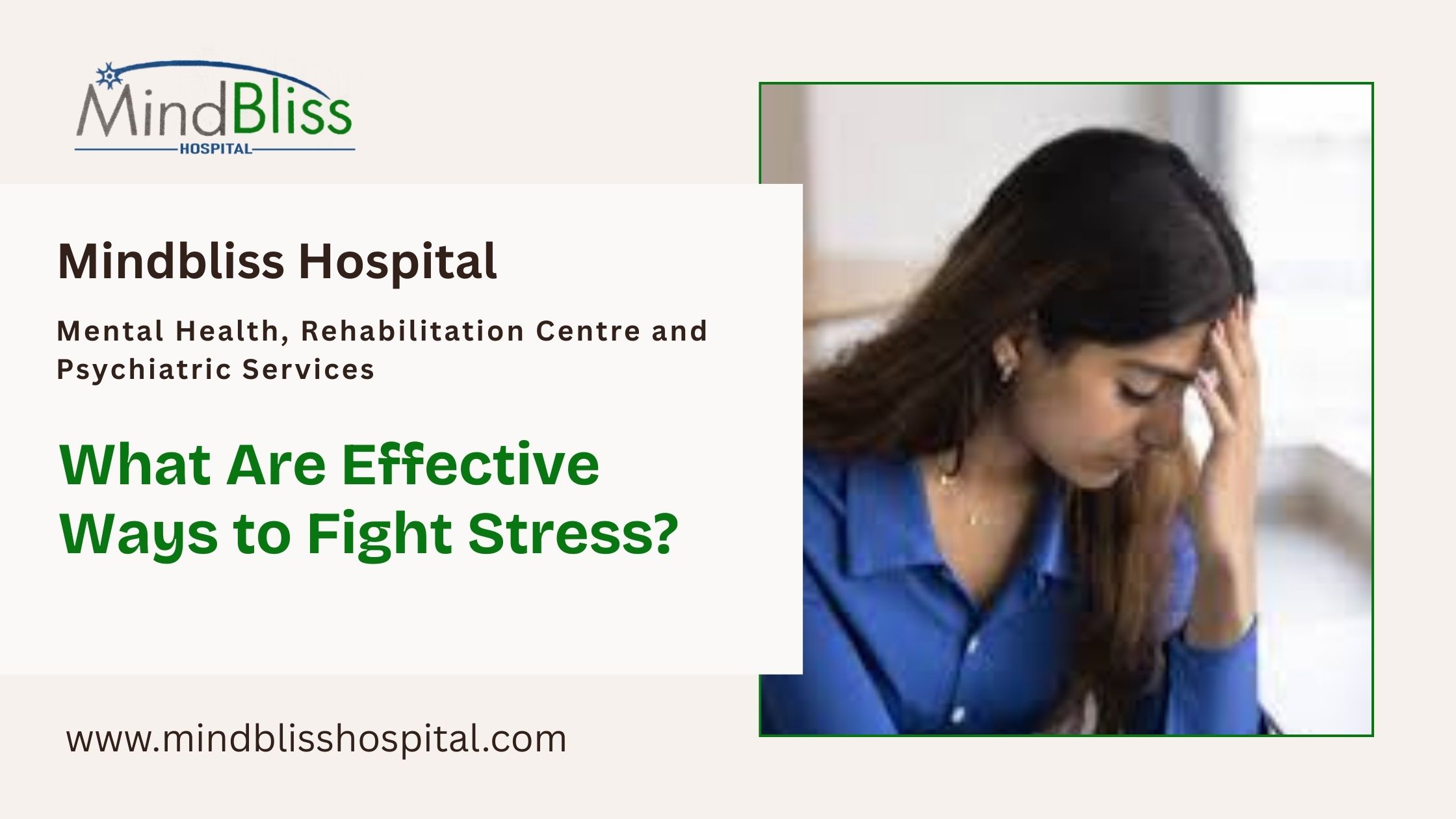
What Are Effective Ways to Fight Stress?
Effective Ways to Fight Stress and Improve Mental Health with Mindbliss Hospital
In today’s busy world, many people are asking, “What are effective ways to fight stress?” From work pressure and financial worries to personal challenges and health concerns, stress can affect anyone at any time. If not handled properly, it can lead to serious mental and physical health issues like anxiety, depression, sleep disorders, and high blood pressure. That’s why it’s important to understand simple and effective ways to manage stress early. At Mindbliss Hospital, a trusted psychiatrist, mental health and rehabilitation centre in Himachal Pradesh also offering services in Punjab, we help individuals find long-term solutions to stress and emotional health. In this blog, we’ll explore the most effective ways to fight stress and regain control of your life.
Understanding Stress
Stress is a natural response to the challenges and demands of life. While some stress can be motivating, excessive or chronic stress may take a serious toll on your mental and physical well-being. Whether it’s due to work pressure, personal issues, or lifestyle habits, unmanaged stress can lead to long-term health complications.

At Mindbliss Hospital, widely recognized as one of the best mental health facilities in Himachal Pradesh, we deeply understand the profound impact stress can have on individuals, families, and communities. Whether it’s caused by daily life challenges, emotional trauma, or mental health disorders, unmanaged stress can disrupt personal well-being and relationships. At Mindbliss, your mental health is our top priority, and we’re here every step of the way.
What Is Stress?
Stress is your body’s way of reacting to any kind of demand or threat. When you feel threatened, your nervous system responds by releasing stress hormones like cortisol and adrenaline. This response, also known as the “fight or flight” reaction, is essential for survival—but when it becomes constant, it can harm your health.
Common signs of stress include:
- Irritability and mood swings
- Sleep problems or poor sleep habits
- Muscle tension and fatigue
- Loss of concentration
- Anxiety and depression symptoms
Over time, chronic stress may also trigger more serious mental health disorders such as bipolar disorder, anxiety depression, and substance abuse.
Common Causes of Stress in Daily Life
Understanding the root causes of stress is key to managing it. Stress can stem from external situations or internal thoughts. Some common daily stressors include:
- Work deadlines or job insecurity

- Family or relationship conflicts
- Financial struggles
- Social pressure or isolation
- Health issues
- Unhealthy lifestyle habits like drinking alcohol, smoking addiction, or poor sleep habits
In many cases, individuals turn to temporary solutions like sleeping pills, alcohol, or smoking to cope. Unfortunately, these habits can increase stress over time and even lead to drug addiction or dependency.
Impact of Stress on Mental and Physical Health
Unmanaged stress doesn’t just affect your mood—it can disrupt every system in your body.
1.Mental Health Effects:
- Triggers or worsens anxiety depression
- Increases risk of developing bipolar disorder and other psychiatric conditions
- Causes emotional instability and lack of motivation
- Leads to dependence on substances like alcohol or drugs
2.Physical Health Effects:
- Raises blood pressure and heart disease risk
- Weakens the immune system
- Causes gastrointestinal issues
- Disrupts sleep cycles, resulting in sleep problems
If you or someone you know is struggling with stress alongside substance use, a rehabilitation centre for drugs can provide the necessary support. At Mindbliss Hospital, we combine psychiatric therapy, addiction treatment, and wellness coaching to help individuals recover fully.
Signs and Symptoms of Stress
Recognizing the signs and symptoms of stress is the first step toward managing it effectively. Stress can manifest differently in every individual, impacting emotional well-being, physical health, and behavior. If left untreated, chronic stress may lead to serious mental health concerns, such as anxiety, depression, bipolar disorder, or even substance abuse problems like drug addiction or smoking addiction.
1. Emotional Symptoms
Stress has a profound impact on emotional health. It often begins subtly but can escalate into severe psychiatric conditions if not addressed. Emotional symptoms include:
- Irritability, mood swings, or constant frustration
- Feeling overwhelmed, anxious, or hopeless
- Difficulty relaxing or staying calm
- Sadness, loneliness, or emotional numbness
- Symptoms overlapping with anxiety depression or bipolar symptoms
When emotional symptoms persist, they can significantly impair quality of life and may require treatment at a specialized depression hospital or psychiatric care facility.
2. Physical Symptoms
Stress doesn’t just affect the mind—it takes a toll on the body as well. Physical symptoms of stress may include:
- Chronic fatigue or low energy
- Headaches or migraines
- Muscle tension, back pain, or neck stiffness
- Gastrointestinal problems like nausea or constipation
- Sleep problems due to poor sleep habits, nightmares, or insomnia
- Increased dependence on sleeping pills or other sedatives
Prolonged physical symptoms of stress can weaken your immune system and increase vulnerability to illness. Seeking help from a licensed mental health professional or a rehabilitation centre for drugs can offer lasting relief and recovery.
3. Behavioral Changes
Stress often causes shifts in behavior that affect your daily functioning, work performance, and relationships. These changes can be warning signs of deeper psychological distress:
- Avoiding responsibilities or isolating from others
- Overeating or loss of appetite
- Nervous habits like nail-biting or pacing
- Relying on harmful coping mechanisms such as drinking alcohol, smoking, or drug use
- Increased dependence on substances, potentially leading to smoking addiction or drugs addiction
Left unaddressed, these behavioral patterns may worsen, making professional intervention necessary. Our expert team at Mindbliss Hospital offers integrated care for patients dealing with stress-related disorders, addiction, and mental health issues through one of the best mental health facilities and rehabilitation centers for drugs in the region.
What Are Effective Ways to Fight Stress?
Chronic stress can damage your mental and physical health, often contributing to conditions like anxiety, depression, bipolar disorder, and sleep problems. Fortunately, there are many effective strategies to combat stress before it takes a toll. At Mindbliss Hospital, recognized among the best mental health facilities in Himachal Pradesh, we guide individuals in adopting holistic, sustainable stress-management practices tailored to their lifestyle and needs.
Below are proven methods to manage and reduce stress effectively:
-
Practice Deep Breathing and Meditation
Simple breathing techniques and mindfulness practices like meditation can significantly reduce stress hormones in your body. Even 10 minutes a day of deep breathing can help calm the nervous system, sharpen focus, and ease emotional symptoms related to anxiety, depression or bipolar symptoms.
Mindfulness is a cornerstone of many therapies offered at our depression hospital, helping patients become more self-aware and emotionally resilient.
-
Exercise Regularly
Physical activity is one of the most effective natural stress relievers. Whether it’s a brisk walk, yoga, or gym workout, exercise releases endorphins—your body’s “feel-good” chemicals.
Regular workouts can also improve sleep problems, reduce irritability, and support recovery from smoking addiction, drug addiction, and other stress-related behaviors. For those undergoing treatment at a rehabilitation centre for drugs, movement therapy is often part of the healing process.
-
Maintain a Healthy Diet and Sleep Routine
Your body needs proper fuel and rest to manage stress. Eating balanced meals with plenty of fruits, vegetables, and hydration can reduce fatigue and stabilize mood. Avoiding sugar-laden or highly processed foods is especially important for individuals managing bipolar disorder or anxiety depression.
Likewise, prioritizing sleep hygiene—such as a regular bedtime, avoiding screens before sleep, and limiting sleeping pill use—can help correct poor sleep habits and prevent stress buildup.
-
Stay Connected with Friends and Family
Isolation often worsens stress. Staying socially connected with people who uplift you can be incredibly healing. Regular conversations and shared experiences can reduce feelings of loneliness and prevent mental health decline.
Supportive social circles are especially crucial for those recovering from drinking alcohol dependency, drug addiction, or struggling with bipolar symptoms.
-
Manage Time and Set Priorities
One major source of stress is feeling overwhelmed by responsibilities. Learning to plan your day, break large tasks into smaller ones, and say “no” when necessary helps reduce that load. Effective time management boosts confidence and creates room for personal growth—an essential component in long-term mental health recovery.
Our team at Mindbliss Hospital often incorporates time-management training into therapy for individuals battling anxiety, depression or burnout.
-
Limit Screen Time and Social Media Use
While technology keeps us connected, excessive screen time and social media scrolling can increase stress and comparison anxiety. Set boundaries around usage—especially before bed—to prevent sleep problems and overstimulation.
Overuse of digital platforms is also known to exacerbate poor sleep habits and emotional distress in people with bipolar disorder and anxiety depression.
-
Take Breaks and Engage in Hobbies
Spending time on hobbies such as painting, reading, music, or gardening provides mental relief and joy. Creative and leisure activities improve focus, reduce irritability, and offer a healthy distraction from triggers that lead to harmful coping habits like drinking alcohol or smoking.
Therapeutic recreation is part of our approach at Mindbliss Hospital, where patients in our rehabilitation centre for drugs are encouraged to rediscover passions and build a stress-free lifestyle.
-
Avoid Alcohol, Smoking, and Caffeine
Many people turn to drinking alcohol, smoking, or caffeine as quick fixes for stress. However, these substances often lead to long-term problems such as sleep problems, smoking addiction, and drug addiction. They also increase the risk of mental health disorders like bipolar disorder and anxiety depression.
Seeking help from a professional rehabilitation centre for drugs, like Mindbliss Hospital, can help break the cycle of dependency and restore a healthier, balanced life.
When to Seek Professional Help
While lifestyle changes and self-care strategies are valuable in managing stress, there are times when professional intervention becomes essential. Ignoring prolonged stress can lead to serious mental health conditions like anxiety, depression, bipolar disorder, and even substance dependence, including drinking alcohol, smoking addiction, or drug addiction.
Signs You May Need a Mental Health Expert
You should consider consulting a mental health professional if you experience:
- Persistent feelings of sadness, hopelessness, or fear
- Intense mood swings or bipolar symptoms
- Inability to sleep or chronic sleep problems
- Dependency on sleeping pills to fall asleep
- Escalating use of substances like alcohol or drugs
- Trouble coping with daily responsibilities
- Withdrawal from family, friends, and routine activities
- Physical symptoms without a clear cause (e.g., fatigue, headaches)
These signs may point toward serious conditions like bipolar disorder or anxiety depression, which require more than just self-care—they need structured, clinical support.
Benefits of Counseling and Therapy
Talking to a trained therapist can help you unpack emotional distress, recognize negative patterns, and build healthier coping mechanisms. Counseling also supports:
- Improved sleep hygiene and correction of poor sleep habits
- Reducing dependence on harmful substances like alcohol or nicotine
- Managing triggers that lead to smoking addiction or drugs addiction
- Healing from trauma, relationship issues, and burnout
At Mindbliss Hospital, therapy is tailored to your specific needs—whether you’re battling stress alone or as part of a deeper mental health condition.
Role of Psychiatric Support in Stress Management
When stress becomes chronic or leads to mental illness, psychiatric intervention is often required. Psychiatrists are medical doctors who specialize in diagnosing and treating mental disorders. They can assess your symptoms, offer medical insights, and guide you through a structured recovery plan.
Our psychiatric services at Mindbliss Hospital, a trusted depression hospital and rehabilitation centre for drugs, focus on both mental and physical health—ensuring a complete path to wellness.
How Psychiatrists Help with Stress
Psychiatrists can help you manage stress by:
- Conducting psychological evaluations to diagnose underlying conditions
- Creating personalized treatment plans based on symptoms and severity
- Prescribing medication when necessary (e.g., for severe anxiety depression or bipolar disorder)
- Offering psychotherapy and behavioral interventions
- Monitoring progress to adjust care based on your response
If you’ve relied on harmful habits like drinking alcohol, sleeping pills, or smoking to cope, psychiatric care can help you find safer, healthier alternatives.
Medication vs. Therapy: What Works Best?
Both medication and therapy are effective in treating stress-related disorders. The best approach depends on the individual.
- Therapy (like CBT or talk therapy) helps with stress caused by emotional or situational factors.
- Medication may be prescribed for severe or clinical conditions like bipolar disorder or anxiety depression, especially when symptoms interfere with daily life or cause sleep problems.
In many cases, a combination of both yields the best results. At Mindbliss Hospital, we follow an integrative approach that combines therapy, lifestyle changes, and medication when needed.
Why Choose Mindbliss Hospital for Stress Treatment?
In today’s fast-paced world, stress has become an unavoidable part of life. From work deadlines to family responsibilities, financial pressures to social expectations, stress can silently affect your emotional and physical health. But you don’t have to deal with it alone. Mindbliss Hospital, a trusted name in mental healthcare across Himachal Pradesh and Punjab, offers compassionate and comprehensive stress treatment designed to heal, empower, and restore balance in your life.
Expert Psychiatric Care in Himachal Pradesh and Punjab
At Mindbliss Hospital, we understand that stress is more than just feeling overwhelmed—it can lead to serious issues like anxiety, depression, insomnia, and even physical ailments if left untreated. Our team of qualified psychiatrists, clinical psychologists, and therapists specialize in diagnosing and treating all types of stress-related conditions.
We provide:
- Accurate diagnosis through detailed psychological assessments
- Individual and group therapy sessions
- Medication management when needed
- Stress coping strategies and behavioral therapies
Whether you’re in Shimla, Una, Kangra, or Ludhiana, our experts are accessible and committed to helping you take control of your mental well-being.
Holistic Mental Health and Rehabilitation Services
Stress treatment at Mindbliss Hospital isn’t just about medications or therapy—it’s about healing the mind, body, and soul. Our holistic approach sets us apart:
- Cognitive Behavioral Therapy (CBT) to challenge negative thinking patterns
- Yoga and mindfulness sessions to calm the nervous system
- Nutritional counseling to improve mental clarity and energy
- Rehabilitation programs for those facing chronic stress, burnout, or substance use issues
By combining modern psychiatry with wellness practices, we ensure that each patient gets long-term relief and learns to thrive again.
Confidential, Personalized, and Affordable Care
We know that mental health is a sensitive topic, and seeking help can feel overwhelming. That’s why confidentiality is at the heart of everything we do. Every patient receives:
- One-on-one consultation in a safe and judgment-free space
- Personalized treatment plans tailored to your lifestyle and stress triggers
- Budget-friendly options without compromising quality care
Mindbliss Hospital is committed to making mental healthcare accessible to everyone. With centers in Bilaspur, Una, and other key cities, we’ve become a go-to destination for those looking for effective and compassionate stress treatment in North India.
FAQs:
- What are some simple daily habits to reduce stress naturally?
Incorporating practices like deep breathing, regular physical activity, and maintaining a balanced diet can significantly alleviate stress. Additionally, engaging in hobbies and ensuring adequate sleep are essential for stress management.
- How does exercise help in managing stress?
Physical activity stimulates the production of endorphins, the body’s natural mood lifters. Regular exercise also improves sleep quality and reduces anxiety.
- Can mindfulness or meditation reduce stress levels?
Yes, mindfulness and meditation techniques help in focusing the mind, reducing negative thoughts, and promoting relaxation, thereby lowering stress levels.
- What are the signs that stress is affecting my health?
Symptoms such as persistent fatigue, sleep disturbances, irritability, and physical ailments like headaches may indicate that stress is impacting your health.
- How can I manage stress without resorting to substances like alcohol or smoking?
Developing healthy coping mechanisms such as engaging in physical activities, seeking social support, and practicing relaxation techniques can help manage stress effectively.
- When should I seek professional help for stress management?
If stress leads to persistent feelings of anxiety, depression, or interferes with daily functioning, it’s advisable to consult a mental health professional for guidance and support.
Conclusion
Stress is an unavoidable part of life, but how you manage it can make all the difference in your mental and physical well-being. By adopting effective strategies such as deep breathing, regular exercise, healthy eating, maintaining social connections, and seeking professional support when needed, you can take control of stress before it negatively impacts your life.
At Mindbliss Hospital, we are dedicated to helping you find personalized, compassionate care that addresses both your emotional and physical health. Whether you’re dealing with mild stress or complex mental health challenges, our expert team in Himachal Pradesh and Punjab is here to support your journey towards lasting peace and resilience. Remember, taking the first step to manage stress today can lead to a healthier, happier tomorrow.










